LOST 021 - Charlie Work
The only thing that can stop two good guys with the guns is the bad guy with the guns. Unpacking the TV show LOST — Season 2: Episodes 11-13

More LOST for the LOSTies? Why not?
Previously, on LOST: Oceanic 815 went smashy-crashy mid-air above an island, which should have resulted in 100% fatality but for about 40 people resulted only in an indefinite stranding—lucky them! About 15 of these 40 became main characters, meaning they have character arcs and often tragic backstories and whatnot, and this is sometimes slightly less lucky for them, but at least it means that if/when they die, we’ll know their names1. Unfortunately, they aren’t alone on the island; there’s another group or groups already there, and at least one of these groups of Others has a habit of abducting children, for reasons we’ll get deeper into next time.
Our castaways consider child abduction to be unfriendly behavior. Tensions are high.
Also: our heroes discovered this weird bunker where a numerical sequence has to be entered into a computer every 108 minutes or the world maybe ends. That bunker was full of: a lot of food; several classic albums on vinyl (at least one of them depressing to mourning Iraquis); approximately one (1) Scotsman (currently missing); and approximately a hundred (100) guns.
We’ve already had some episodes concerning the Scotsman, the albums, and the food.
These episodes will mostly concern the guns.
O B S E R V A T I O N
Yes, this is going to be a swing of three episodes that focus on the matter of being heavily armed while not getting along with your neighbors, and also feature some flashbacks, which don’t distinguish them much from other episodes. These flashbacks won’t tell us much new about the characters they highlight, but they do feature some decent-to-strong acting by the actors, so … hey, good job, actors!
I’m going to point to this set of episodes as the moment in the series where the flashback structure—which has already delivered a couple clunkers—starts to wear thin permanently. We’ve got another season and a half before it ends, by which time the flashbacks are going to be as tattered as Eko’s shirt. Now might be a good time for a reminder about one major reason why.
The series in Season 2, like all hit shows, had no specific endpoint. Rather famously, the creators had a narrative structure in mind, but didn’t know how much canvas they had upon which to paint. Some shows aren’t afforded time enough to wrap up their story before they’re cancelled. LOST had the opposite problem; it was a hit, and hits tend to go on and on as long as they can—which meant that they had to vamp, lest they run out of story to tell long before they ran out of time to tell it.
I think they actually vamped well in the main tale of Season 2, introducing fascinating new characters and important plot developments that make it (to give what is definitely not a majority opinion) superior to Season 1—but even as they did so, they didn’t have similarly story-relevant moments in the character backstory planned, and so the flashbacks began to retread the same old beats: Jack has control issues; John’s desperation for belonging and meaning makes him vulnerable to manipulation, etc., etc. Inevitably it started to get repetitive and redundant and repetitive (also redundant). Significantly, this period of narrative drift occurred when a huge audience was still watching and getting more and more frustrated, and I believe that led to the dominant narrative that the show was progressing with no plan (when in fact they were meting out their story in tiny morsels to avoid burning up that plan too quickly) … a narrative that solidified when many of those frustrated people left and never returned.
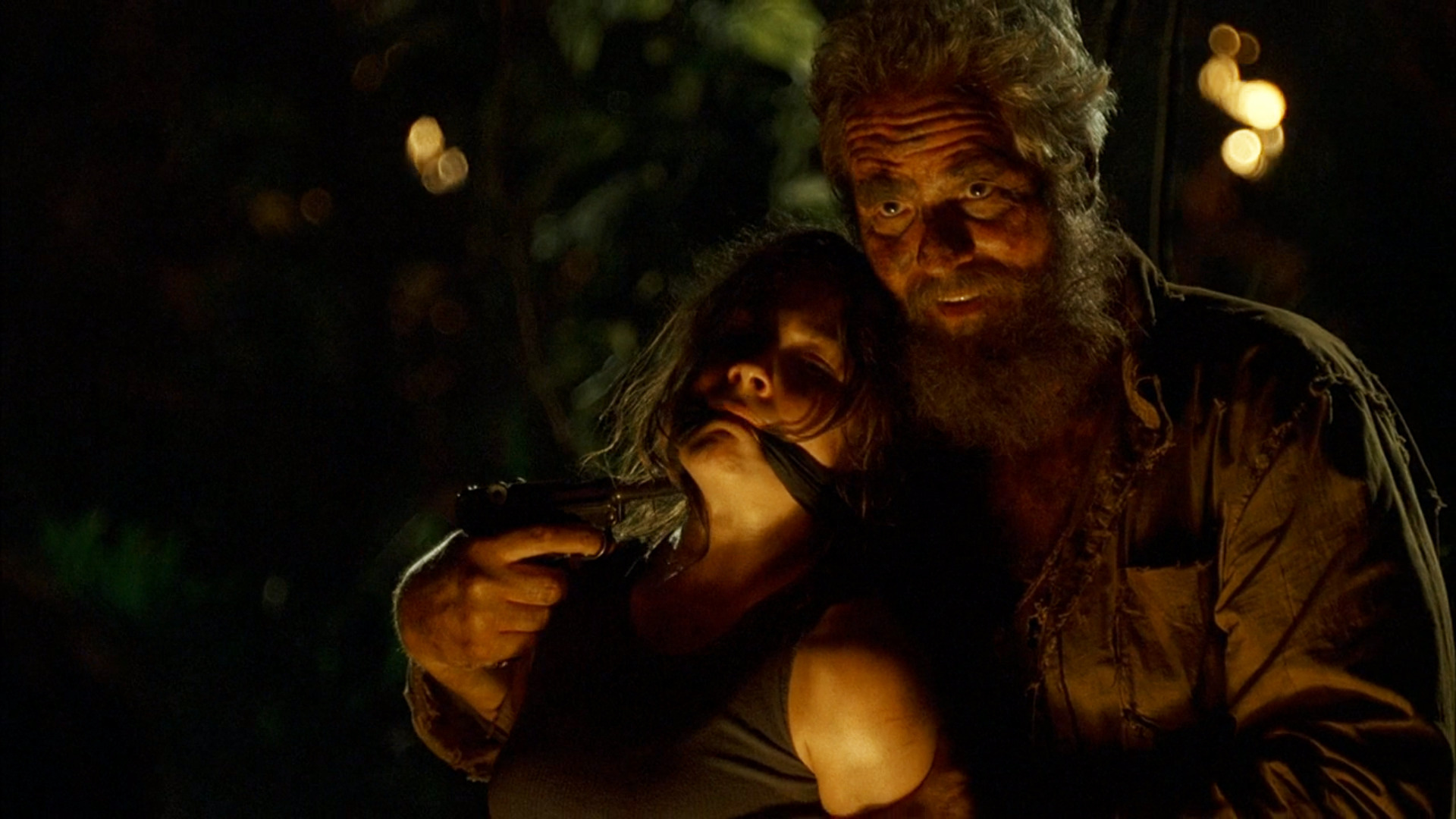
Episode 11: THE HUNTING PARTY (Jack): I promised you gun talk. Let’s get right to the gun talk. Locke has recently been teaching Michael to shoot, using the guns in the Swan station and tubs of ranch as targets (wasteful!), and this proves to be a mistake, because Michael kicks this episode off by conking out Locke, taking a gun, ambushing Jack, locking his friends in the gun safe, and running off after his abducted son, Drippin’ Wet Walt. Oops.
This sends Jack Of Course on a mission to get their misguided friend back, accompanied by Sawyer and Locke. Kate Of Course wants to come along, and Jack Of Course annoyingly refuses to let her, because he is the island boss, and he’s in love with her, and can’t bear the thought of his girl in danger and so she must obey, and Kate Of Course ignores him completely (which I love) and follows them, using her superior tracker skills, but that’s all a part of the story not so she can save them but so she can later get captured and be the scapegoat for why Jack’s badly planned mission failed, and that’s annoying.
Also annoying: they don’t bring Sayid, who is probably the most capable guy they have in these sorts of situations. Also Sun forbids Jin to go, and that’s annoying to Jin, who realizes in a nice bit of character work that his years of domineering behavior over Sun, which unlike her edict didn’t even have a reasonable basis, likely felt very similar to her.
Anyway, the away team goes tearing off into the underbrush without three of their starters, so it perhaps shouldn’t be surprising that they’re easily overcome by The Others, who surround them with their superior jungle-craft (the episode’s one really cool scene is this showdown, which features dozens of extremely near Others torches going on at once). The Others’ spokesman is the same menacing beefy bearded guy who we saw take Walt off the raft, and he has not gotten less bearded or menacing in the ensuing weeks. He tells them that they, the Oceanics, are guests on their island, and they’ve been pretty obtrusive and inconsiderate guests, so they’d better keep in their area and cease all the shenanigans or there will be consequences and repercussions. He then gets them to give up all the guns they brought with them by threatening to shoot—surprise!—captured Kate, although even if they didn’t have Kate to threaten, I’m not exactly sure what Jack thought he was going to do in that spot if he refused, other than probably die quickly.
Yeah, so. They leave without guns or Michael.
This story is accompanied by the umptheenth Jack-back, which once again demonstrates that Jack is an obsessive fixer who takes on the weight of the world to prove to himself that he is a better man than his shitty father, whose approval he craves and never receives. In this episode, Jack’s well-established personality flaws cause his marriage, which we already know fell apart, to fall apart.
Back on the beach, Jack asks Ana Lucia, who has killed at least one Other, to help him recruit an army. This is a plot that will get mentioned glancingly exactly one more time after this, and will otherwise go exactly nowhere.
Perhaps you won’t be surprised to learn this isn’t my favorite episode.
End of Episode 11.
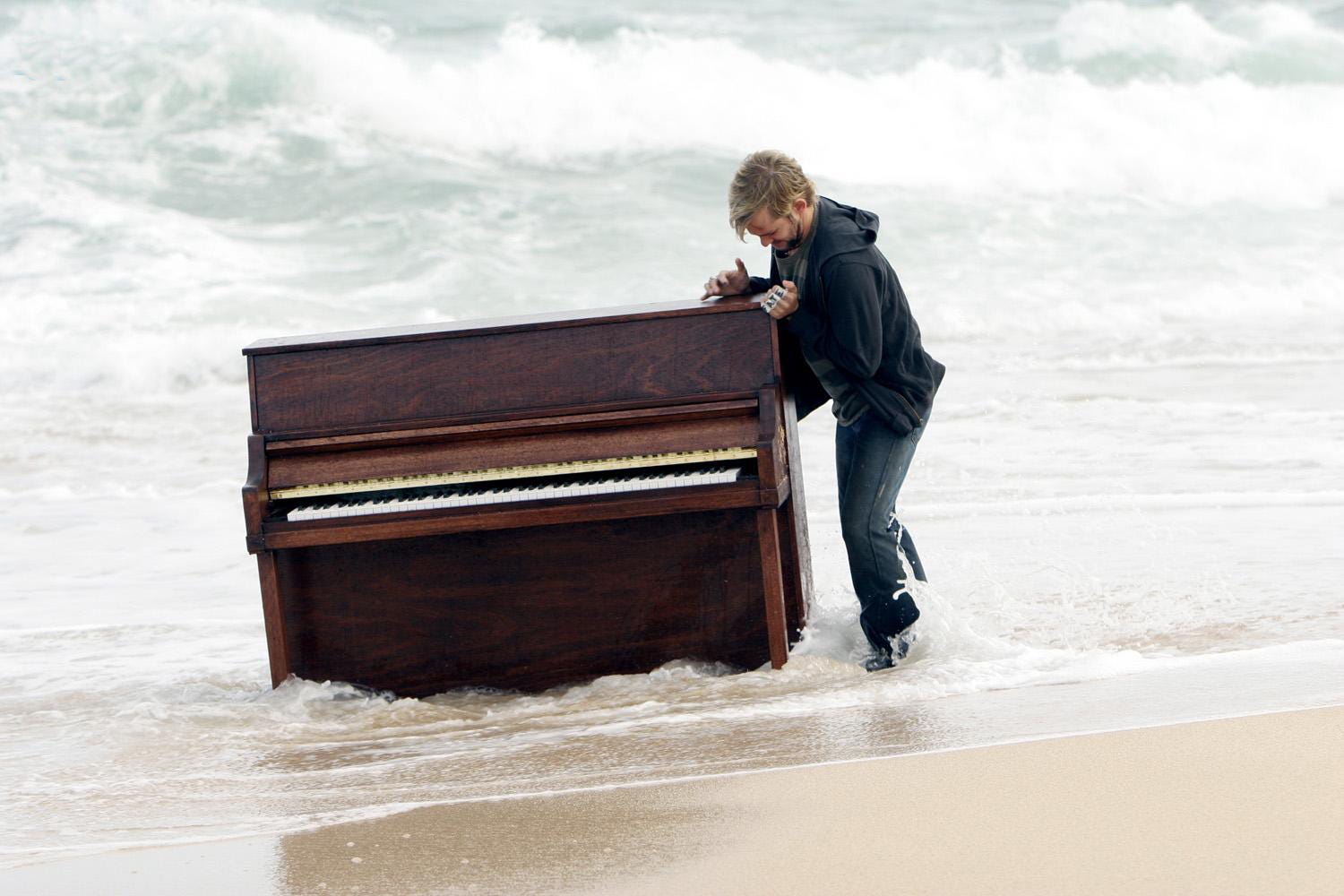
Episode 12: FIRE + WATER (Charlie) Speaking of people who have killed an Other, Charlie’s been having a rough time in a much more interesting episode.
For one thing, he’s been caught holding a stash of heroin. This means he's out of the good graces of Claire (who he’s clearly sweet on), and her baby Aaron (with whom he’s clearly formed a strong attachment). Additionally, he’s having vivid dreams of his past life that inevitably bleed into the circumstances of his current life, and feature Aaron in danger from various things, but mostly of drowning, in mostly the ocean.2
Oh! and also, when he wakes up from these dreams, he discovers he’s been doing things like sleep-abducting Aaron and bringing him down to the ocean, which rather understandably increases his alienation from the rest of his fellow survivors. He looks for a bit of a reputation boost from onetime mentor Locke, but Locke gives him the brush-off, suggesting that he suspects Charlie is back on the drugs and is no longer to be trusted. We’ve already spent some episodes watching Charlie deal with a growing sense of jealousy toward Locke, upon whom Claire has come to rely in Charlie’s place, and Locke’s rejection doesn’t make him feel any kindlier toward our bald avenger. When Locke later follows Charlie to his stash of heroin Marys, roundly scolds him, and confiscates the icons, the rift between the two is nearly complete.
There’s a moment back on the beach where the camera swivels around Locke’s head as he watches Charlie start to come unglued, a swivel that comes to rest on Locke's rather menacing-looking face while ominous music rises, which exactly mirrors the way the character was introduced way back in Season 13. (Hold onto that thought.)
Charlie talks to Eko, who is off marking the trees that he likes4. Eko, a priest, gives Charlie the idea that his dreams are indeed significant, and mean the baby needs to be saved in a Christian sense—a baptism. Charlie, increasingly desperate and unbalanced, takes Eko's advice but not his meaning. He sets a fire to distract the group so he can snatch Aaron and run him down to the shore, but he's caught before he can consummate this civilian consecration, and there's scads of castaway consternation, and The Gang Loses Their Trust In Charlie.
Charlie returns Aaron, unbaptized, to an understandably furious Claire. The immediate threat of serial baby-snatcher Charlie now resolved, Locke pounds Charlie’s face, once, twice, three times a Charlie. This appears to be a rather cold-blooded and premeditated act of retribution, and is honestly a pretty un-Lockish move, in my opinion. (Hold onto that thought, too.)
In the B story, Hurley is sweet on Libby, and he and Libby flirt over laundry. Hurley suddenly seems to remember Libby, and, after taking a beat, Libby claims they met on the flight, when he stepped on her foot. This is not something we saw happen, but it does seem designed to play into Hurley’s insecurities in a way that would shut down any further line of questions. The way Cynthia Watros plays this scene is pretty darn subterfugish, if you ask me (and if ‘subterfugish’ is a word), so if you agree, score another point for the “Libby is a part of some faction or other” theory.
The next day, Eko gives Aaron and Claire a (slightly more) proper baptism.
At the Swan, Locke changes the combination on the safe and locks up the heroin Marys.
On the beach, Charlie sits alone, staring with dead eyes at his sad little campfire, and lifts the hoodie of future bad deeds over his head.
End of Episode 12.
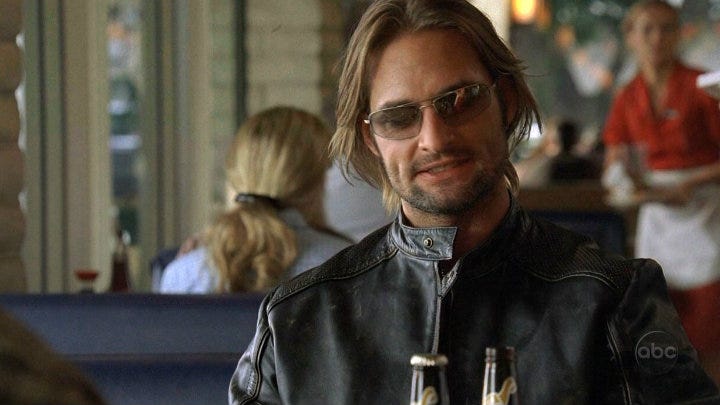
Episode 13: THE LONG CON (Sawyer). Jack and Locke have made an uneasy peace, and now they’re making inventory of the contents of the Swan safe. Locke agrees to share the new combination with Jack, but it’s clear these two don’t trust each other.
Meanwhile: a running subplot over the last several episodes has been Sawyer’s dawning realization that he’s now viewed as a trusted friend within his community—all this to his visible but thus-far good-natured consternation, and reaction shots of Kate clearly thinking it is very cute. It’s all been played to comic effect so far, but now Sawyer is pissed. While he was off on the raft, everyone came and took his stuff, and nobody really takes his claims of private ownership seriously anymore, and nobody seems particularly intimidated by him, either. When Jack just goes rumaging through his tent for some pills, it’s the last straw. Sawyer wants it back—“it” seemingly being more his reputation as island lone wolf than his actual possessions.
He engages in an elaborate con to steal the guns from Locke and Jack, the details of which don't come out until the ostensibly surprising end5, but which I'll just give you straight up. First, he engages Charlie to attack Sun6 in a terrifying and brutal scene that is decidedly un-Charlie-ish (hold onto that thought). Sawyer uses all the new paranoia the attack generates to exploit the rift of trust between Jack and Locke, tricking the at-least-for-now-level-headed Locke into moving the guns, in order to keep them away from currently-army-building-revenge-minded Jack. Locke is tailed during this task by Charlie, who wants to make Locke look foolish in revenge for all the punching, girlfriend stealing, surrogate-father-role replacing, etc. Charlie tells Sawyer the new location of the guns; Sawyer gets the guns.
Once Sawyer has his armory, he reveals his whole dastardly plot in properly dramatic Sawyer fashion, and announces that he is the new sheriff. You want guns? You come see Sawyer. Say hi to the bad guy. Game, set, and hatch.
Kate is disappointed in and hurt by her island boyfriend’s machinations. Sawyer’s all “tough beans, freckles,” but you can tell it’s eating him up inside, because (as we learn yet again in yet another Sawyer flashback) Sawyer is a scoundrel with a heart, but he’ll always break his own heart by betraying the one he loves. Why? Because it reminds him that he’s as bad as he always insists to himself he must be, that’s why. He’s a complicated guy, sweetheart.
In the B story, Sayid fixes Bernard’s shortwave radio, and gets it to play a waltz from the Glenn Miller Orchestra on some radio program from the outside world. He Sayid-splains that the frequency is bouncing off the ionosphere, so it could be coming from any place, to which Hurley intones “or any time,” and Hurley’s joking, but I think that’s a purposeful hint from the writers.
End of Episode 13.
B E L I E F
Here are four things I believe, relative to what we’ve observed.
1) Glenn Miller: More hints to the very first question asked, which is “Guys? Where are we?” I’ve mentioned before that we’ll eventually learn that the island is a moon of Earth of sorts, moving in a geosynchronous orbit around the planet. But we’ll also eventually learn that when you return to the island, you might not return at the same time as others returning to the island. It’s not important that you believe this particular bit, but I believe that the recording they are hearing is an original recording, caught from the 1940s, caught by people from the early 2000s who are on an island that is not just in a geosynchronous orbit, but a chronosynchronous one. In other words, just as the island is sometimes in the Pacific, and sometimes is in parts of northern Africa, and sometimes is other places, too, it’s also sometimes in 2005, and sometimes in the 1940s, and sometimes in the 1970s.
You might think I’m hanging a lot on a single radio broadcast. That’s fair enough … except I’m not doing that. The radio broadcast is merely the first hint.
2) Mr. Friendly: Our Others’ spokesman isn’t named in this episode, but for first-time watchers at the time of broadcast, he loomed large, particularly after this episode aired. His name, we’ll eventually learn, is Tom Friendly, and he’s a member of the Dharmite faction of Jacobians, and a trusted lieutenant of that faction’s leader, Ben Linus. He’s actually going to be portrayed as a relatively nice fellow in future seasons, so I think it’s fair to say that he’s putting on a bit of a show here, to menace the Oceanics out of their guns … but at the same time, I don’t believe Jack was right to assume he was bluffing, and I’m not entirely sure it’s entirely an act7.
What I mean by this is that Ben Linus is, we’ll learn, deeply enthralled to The Adversary, and it’s a likely enough extrapolation that his people—especially his closest people—share in that to some degree or another. We know from Danielle Rousseau that the whispers of spirits attend the appearance of The Others, and I believe that this is because the spirits attend The Adversary, and the Adversary often comes along with The Others, whether they know it or not.
We also know that people working for The Adversary exhibit acts of unusual strength and stealth, seeming to appear from nowhere, without a warning, without leaving a trace, and tend to be at the extreme end of their own personal scale of potential menace when they do so. And we know that when they do this, they often find themselves doing so in a sudden and unexpected rainstorm. It’s for this reason that I believe when you’re working for The Adversary, you are uncharacteristically strong and uncharacteristically sneaky, and probably more often than not unexpectedly wet.
And speaking of uncharacteristic behavior, that reminds me …
3) Charlie is the first of our main characters to behave uncharacteristically in these episodes—sneaking up on Sun without a sound, attacking her, brutalizing her (he doesn’t just scare her; she’s unconscious for a while), tailing John Locke, helping Sawyer snatch guns … Charlie goes waaaay darker in these episodes than he ever goes again, and I think we’re meant to take Charlie’s claim that he hasn’t been using as true, so I see the influence of The Adversary. I think there’s plenty of evidence available for this.
First, Charlie’s been having dreams and hallucinations, and he isn’t always aware of his actions. We know that The Adversary furnishes people with premonitory dreams (Locke had one in Season 1) and seeming hallucinations (Boone and Shannon being good examples), specifically to manipulate their actions. As for not being aware of one’s actions … well, hold onto that thought just a bit longer.
Next, over the course of the last half-season, we’ve seen Charlie’s course altered by three people I believe are of particular interest to The Adversary: Sayid, who we’ll see all the way in Season 6 as our primary example of somebody going fully enthralled, is the person who (as I covered several installments ago) made Charlie aware of the heroin for no discernable or practical reason; Eko, who first exposed Charlie’s secret stash and convinced Charlie that his dreams and hallucinations might be important, and for some weird reason gave him a replacement heroin Mary; and Locke, whose every action served to alienate Charlie from the group (without anybody really being aware that Locke was in any way involved with that alienation).
If you put together all the available information, it almost seems as if Charlie were a momentary target of The Adversary’s attempts to divide and corrupt, not necessarily his main plan but just a sort of side-hustle to bring a character who had been on a path of redemption back into the darkness, the better to create some murder and chaos. Or, you might say, a long con.
4) Locke, meanwhile, is behaving out of character … and he isn’t. It’s all a question of which Locke are we getting? Are we getting the natural leader who has gained his fellow castaways’ trust, by working for their best interests and helping them find their path, or are we getting the guy who has already attacked his fellow castaways more than once when he thinks they’re going off of the path he intends to enforce? Are we getting the guy who keeps his friends’ secrets for them while holding them accountable, or are we getting the guy who subtly lets Jack know that Charlie was holding a stash? Are we getting the guy who goes to great lengths to avoid escalation of violence, and serves as the voice of reason in Jack’s ear, or are we looking at the man who unnecessarily beats Charlie in front of the group?
Which Locke is the real Locke?
I believe the answer is: both. One of LOST’s favorite tricks is to present you with a situation that the characters believe is a dichotomy, leading we viewers to assume that it is a dichotomy—only to demonstrate in subtle ways that actually it is both at once, but (crucially) without the characters themselves discovering that it’s both … which allows us as viewers to miss that it’s both too, if we are inattentive.
OK, now I want you to remember that brief scene I mentioned earlier—the “camera pans around Locke’s head while the music gets eerie” scene. I’ve mentioned before that much later in the series, The Adversary will enact Its plan, which hinges on manifesting Itself in the person of John Locke. Terry O’Quinn is a very fine actor, capable of marvelous nuance, and the look on his face in these repeated moments in early seasons is, in my opinion, the exact look he uses in later seasons to indicate that he not Locke, but The Adversary.
I believe that’s what we’re being told in these moments as well. I believe that Locke has been uniquely enthralled by The Adversary in a way that allows The Adversary some degree of access to his consciousness, and that this is meant to be read as a moment when The Adversary is at the forefront. I believe that Charlie isn’t the only one who isn’t always aware of his actions, and then has to construct reasons for what he has done after the fact. I believe that John Locke is just a bit better at disguising it—from himself and others—when it happens to him.
I’ve said before that I believe that all the people on the island are corrupted to one degree or another—that this corruption is an unavoidable part of living on the island, and that each character is susceptible to that corruption to one degree or another. I believe that (whether or not you agree with my little theory in the previous paragraph) we can clearly see that John Locke has been corrupted by The Adversary. But I also believe that we can clearly see that John Locke (for example) is working out his destiny—in other words, The Adversary is working with him, but The Island is working with him, too. Which should perhaps not be so surprising, given that The Island doesn’t seem interested in The Adversary’s question of whether or not humans are “worthy.”
Are humans worthy or aren’t they?
It’s not a dialectic. It’s both.
What The Island is interested in is progress.
L O S T
Next Time: Linus & Loosey
Thank you for reading The Reframe. This post is public so feel free to share it.
A.R. Moxon is the author of The Revisionaries, which is available in most of the usual places, and some of the unusual places, and co-writer of Sugar Maple, a musical fiction podcast from Osiris Media which goes in your ears. He’s careful with that axe, Eugene.
RIP Scott and/or Steve. ↩
These dreams are, in my opinion, really well-done and creepy dream logic, which helps make this one of the more effective Charlie episodes. It doesn’t give us new information about the character, but it gives us interesting new facets of what is known, and Monaghan is particularly good. Also, he’s the only cast member who would be game enough to get swaddled in a diaper for a commercial shoot. ↩
Final scene of “Tabula Rasa,” if you are interested. ↩
Hey look, that’s what the man says: they’re the trees he likes. (This cryptic remark will actually receive a somewhat prosaic explanation in an upcoming episode. Eko is building a chapel.) ↩
Sawyer is awesome and I love him precisely because of how over the top he is in his self-torturing scruffy-looking-nerf-herder act, but it does mean that he’s telegraphing his intentions at every moment to a ridiculous degree; I don’t think there’s every much doubt to a discerning viewer that he’s behind what’s happening. ↩
During a sudden and unexpected rainstorm, so add this to my theory that when it rains, the Adversary and his corrupting manipulations are near, and somebody is about to enact murderous-type violence on somebody else. ↩
Oh and also, if you paid close enough attention, it’s somebody named “Alex” that Tom Friendly instructs to bring out captured Kate. That’s sure enough meant to be Alex Rousseau, the snatched child of poor Danielle. More about Alex soon enough. ↩

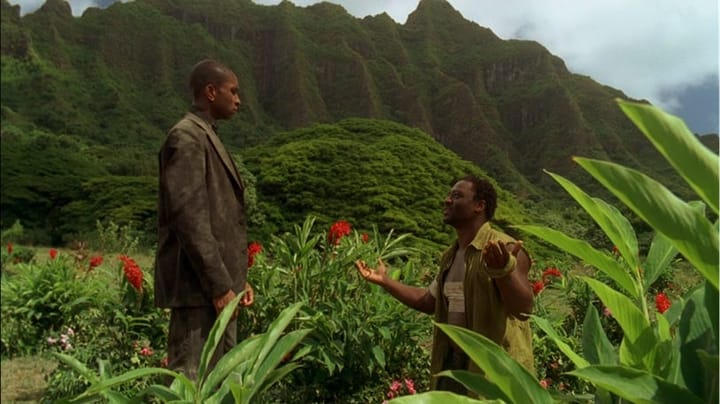

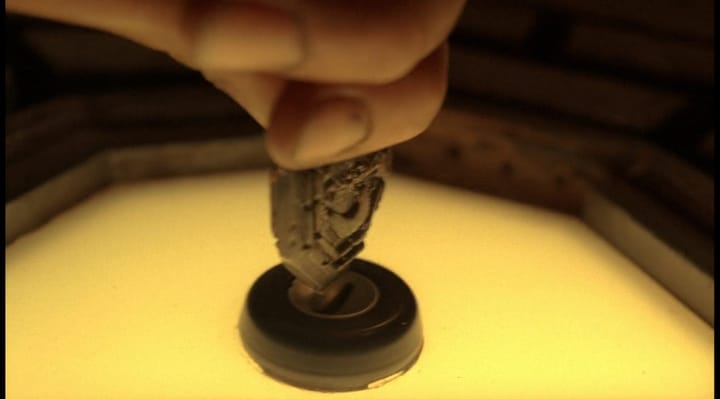
Comments ()